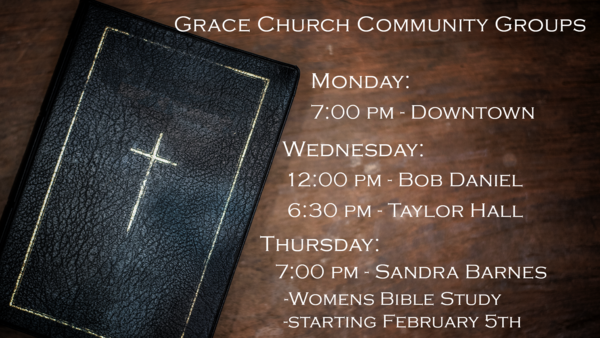|
|

|
Sunday Worship
As we continue to navigate this season of pastoral transition, how do we, as different parts of the Body of Christ, use our diverse spiritual gifts and work together? We turn to 1 Corinthians 12–14, where we will see that God has given each of us different spiritual gifts to use. What does this look like in Christ's church? Let's learn and grow together over the next few weeks. Join us for prayer at 9:30, worship at 10:00, and fellowship downstairs after the service.
|

|
Weather Alert
We are watching weather forecasts about the snowstorm on Sunday. If the weather is bad, the elders will make the call to cancel the service by 7:30 am on Sunday, and will send out a church-wide email. |

|
Community Groups
Community Groups are back! We were made to follow Christ together, in community. Consider which of these groups might work for you. We hope everyone at Grace will join a group. |

|
Prayer FocusMissions Please pray for Pastor Aila Tasse and Lifeway Global as they continue with evangelism and church planting in East Africa. Also, please pray for Stephanie Jones as she begins her role as Director of Children's Ministries. Please also pray for our church family. Partners, look for the Weekly Prayer Update sent out each week as a reminder to pray for the specific needs of our brothers and sisters in Christ. If you or someone you know is in need of prayer, please contact office@gracestamford.org. |

|
Mid-day Prayer on Zoom
Everyone is welcome to pray together on Wednesdays at noon. Contact Bob Daniel at bobdaniel@aol.com or call or text at 203-858-2708. The Zoom meeting ID is: 309 369 9640. |

|
Social Media
|

|
Giving
Our mission and vision are enabled by your generous giving. You can give online anytime, from any device, with our secure, easy-to-use website. Click here to give online. You can also give in-person on Sundays, or by mailing a check to the office. Thank you for supporting Grace! |
Thank You
Thank you for reading the Grace News! Sincerely,
Grace Evangelical Free Church 241 Courtland Avenue, Stamford, CT 06906 (203) 323-6737 | office@gracestamford.org |
